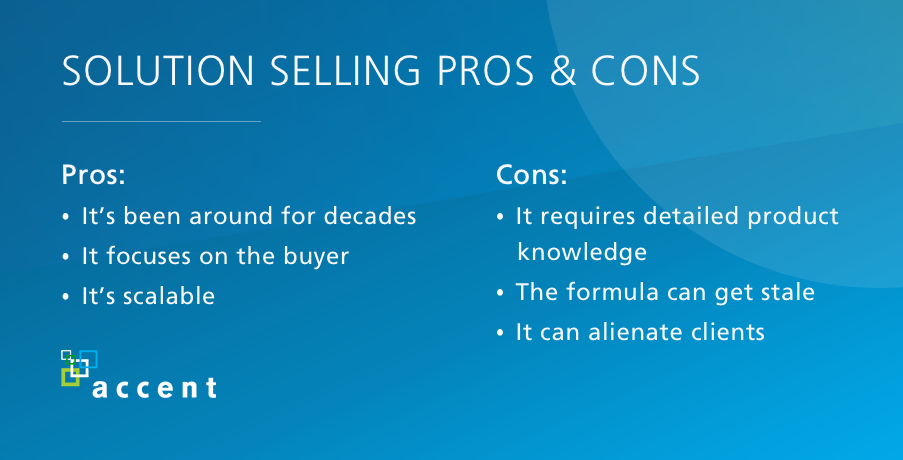uncategorised
Solution Selling
If you’ve been working in sales for any length of time, then you’ve probably heard of solution selling. It’s been one of the foundational sales strategies for the past 50 years, after all.
But if you’re new to the world of sales, the idea of solution-based sales might be foreign to you. Don’t worry, we’re here to break it all down for you.
What is Solution Selling?
Solution selling is a sales methodology that can trace its roots all the way back to the 1970s.
Prior to that decade, a lot of salespeople were focused solely on moving product by finding customers and pointing out how the features, benefits, and price were so good on whatever they were selling that the customer would be crazy not to purchase it.
However, as consumers became savvier, this approach became less effective. People got good at figuring out the psychology of sales tactics and better at researching products. Because of that, sales needed a paradigm shift.
And that shift took the form of solution selling.
Solution selling essentially ushered in a new era of sales tactics by shifting away from the old features and benefits approach by teaching salespeople to discover a person or business’s problem and then work backwards to make their product the answer to the customer’s prayers.
Over the ensuing five decades, solution selling has mutated and morphed, taken on different names (insight selling and too many others to list), and been declared dead. And yet, we’re still talking about it – and every new hot thing in sales seems to, at the very least, build on the foundations created by this methodology.
Whether you’re trying to sell to an individual or an entire corporation with enterprise solution selling, learning the techniques, terminology, and philosophy behind solution selling is vital.
When is Solution Selling a Viable Strategy?
The simple answer here is “always”.
No matter how much times change, and no matter how many “hot” new sales methods we see, solution selling is still a viable approach to closing customers and making deals…with a caveat.
Any system that’s been around for nearly 50 years can get a bit long in the tooth, and solution sales is no exception. What worked in the 1980s isn’t going to work as effectively today – because businesses do more research than ever before and really only invite a salesperson into the purchase process after the company has done their homework.
In this environment, solution selling has had to adapt. It’s not enough for a salesperson to come in and ask the same old open-ended questions that got results back in the Clinton administration.
Today’s solution salesperson has to be more aware – because good companies already know their pain points and problems. Therefore, you need to figure out the problems they don’t realize they have – or weren’t prepared to deal with to be truly effective.
We’ve written an entire blog post about solution-based selling techniques that goes into this in more detail.
That said, helping a customer find solutions to their problems – the heart of solution sales – is never going to go out of style. As companies start to do more and more research on their own, the window of opportunity for finding the business’s problem might be narrower than in the past, but this just means the sales team has to be more focused and dialed in than ever before.
To achieve this, you might want to explore sales AI guided selling solutions that will help you keep a competitive edge by providing greater visibility into buyer responses, buyer behaviors that indicate buying intent, key personas to engage, and recommended next steps based on persona.
Why Should You Use the Solution Sales Technique?
If the fact that it’s a tried and true sales approach isn’t enough to convince you, then consider this: a measly 3% of customers actually trust salespeople.
The reasons for that sobering statistic are many – and some of people’s inherent distrust of salespeople is probably justified (think of all the used car sales associates who’ve taken people for rides. – literally and figuratively – over the years). But if you’re an honest salesperson, you’re facing a lot of negative perceptions and an uphill battle with every potential customer.
Solution selling isn’t some magic tool that you can wave around like that memory eraser in Men In Black to make everyone forget their preconceived notions about sales teams, but it is a way to show customers that you’re actually thinking about them, their specific issues, and how you can provide a solution to the things keeping them up at night.
One of the keys to a successful career in sales is getting people to like and trust you – to see you as a person beyond just being someone who wants to sell them something.
Taking the time to figure out a customer’s problems is a good first step. Solution selling is every bit as much about solving problems as it is selling product.
Remember…97% of customers are predisposed to not trusting you – anything you can do to move that needle in the other direction is worth exploring.

Solution Selling Pros and Cons
So, now that we know a bit about what solution sales is and how effective it can be, it’s time to talk about the pros and cons.
What? You didn’t think we were just going to tell you all the good stuff without pointing out the potential problems too, did you
Pros
- It’s been around for decades: As mentioned earlier, solution sales started in 1970s – and here we are, nearly 50 years later, still talking about it. Sales is filled with new methodologies and attempts to recreate the wheel (just look at the sales book section on Amazon if you don’t believe us…), but solution sales is still being talked about and used. Clearly, it’s built on a foundation that works.
- It focuses on the buyer: Look, at the end of the day, all clients are interested in is whether or not you can solve their problem. They don’t care about you, they don’t care about your company – they care about fixing their own pain. Solution sales understands this and puts the salesperson in a position where they’re entirely focused on the customer and the customer’s problems. No one likes being sold to, but with solution sales techniques it feels more like a conversation focused on the customer’s concerns than an outright sales pitch. At least when you do it properly.
- It’s scalable: Whether you’re selling to a small business or offering enterprise solutions to a company with offices around the globe, solution sales works. The approaches might be different, but the core ideas of finding and solving a customer’s problems is valid whether we’re talking about a company with two employees or FedEx.
Cons
- It requires detailed product knowledge: It seems like a given that your sales team should know your products inside and out, but do they know your competitors’ products? Do they know the problems of the companies they’re targeting? If not, solution sales can easily derail. If your salesperson can’t answer a customer question, it can destroy all the trust you’re working to build. It’s imperative that your sales force should be constantly learning. If this is a con keeping your team from success with solution selling, look into sales AI guided selling solutions that visualize your complex data and make it digestible and actionable for your team.
- The formula can get stale: If you treat solution sales the same way we did back in the 1980s, you’re probably going to have an uphill struggle. We’ve talked about how much more people know these days – so asking the same old tired questions isn’t going to get the job done. Solution sales in the 21st century requires more open communication and critical thinking and less reliance on a deck of questions. If your sales team is running around with a question deck, it’s time to toss that out – or at least make sure it’s revised for each specific customer encounter. Otherwise, it often turns into a question and answer session as opposed to an actual conversation. This is another area where sales AI has advanced enough to really help. Deep analysis and intelligent recommendations can keep your buyer/seller conversations fresh and specific to the customer’s unique challenges.
- It can alienate clients: If your salespeople aren’t at the top of their game, solution sales can feel more manipulative than helpful. Imagine sitting down with a salesperson and being asked a series of questions that are general enough to apply to your company but are also clearly designed to guide you to a predetermined “destination.” In this scenario, customers can feel like they’re being herded to a sale. And while the goal of your salespeople is to always close the deal, you don’t want these interactions to feel like blatantly obvious pitches. The good news is modern technology can help prevent this problem. While sales AI can’t magically make your salespeople more skilled, it can give managers and coaches full visibility into a salesperson’s performance and the interactions with a buyer. It can expose areas that need coaching, recommend resources for further learning, and worst-case scenario – it can expose an underperforming rep that may just not be up to the task.
When executed properly, solution selling can help both the salesperson and the potential customer – but the idea that it’s just sitting down and firing off questions like some weird game of verbal chess where checkmate is achieved when you’ve boxed in the customer to your particular solution is not the right approach.
If you’re not 100% committed, solution selling can actually hurt sales. Buy in and really commit to the techniques to achieve real success.
How to Start Solution Selling
Interested in starting or refining your solution sales process after reading this article? Well, that’s a whole other article in itself, but here are a few things you should think about as you get started or refine your approach
1 Focus on Finding Customer Pain Points:
The key to any solution sales strategy is finding your customer’s unique pain points. And we really should stress “unique” here. While solution sales tactics of old could get away with focusing on universal issues facing an industry, that doesn’t cut it in today’s market. Instead, your salespeople need to find pain points specific to the company – preferably ones they may not even realize they have yet.
In this article we talk about how top sellers have changed the way they target prospects and allies. It’s valuable information that can help your team not only get ahead of the competition, but also help you find opportunities you might have otherwise missed. The biggest mistake you can make in solution selling is staying stagnant – look for the opportunities. Make your own when necessary.
2 Learn to Listen:
Too often, salespeople feel the need to talk – but in today’s world, listening is more important than ever. Don’t come into a client meeting with a stack of open-ended questions. Do your homework, find one potential pain point, and ask about that – and then sit back and let the customer talk. In a best-case scenario, you not only hit on something that’s important to them in the question, but you can start actually formulating ways to help them by listening to their reaction. The sale isn’t about you in solution selling – it’s about the customer. Less “we”, more “you”. Less talking about how you can solve the problem and more listening to what the problem is and how you can help fix it.
3 Sell the value, not the product:
No one likes a sales pitch – even when they’re in the market to buy something.
Too often, sales people focus on selling the product, and why wouldn’t they – that’s what they’re supposed to be selling.
However, in solution selling, it’s often better to sell value than a product. What does that mean? Instead of focusing on the bells and whistles of whatever it is you’re selling, focus on the how it solves a problem or helps a customer get past a pain point instead.
Solution selling isn’t just about selling product – as the name suggests, it’s really about selling solutions. If you can position your pitch as something that provides value and solves a problem, you’re likely to find more success.
Final Thoughts
Many sales gurus will tell you that solution selling is dead – and they’re half right. Solution selling as we knew it in the 20th century isn’t as effective as it once was.
That said, the foundation of the process – listening, solving problems, and providing value and solutions – is as relevant as ever. Solution selling still works in 2020 – it just requires sales teams to shift their focus, target potential customers in different ways, and learn to be a consultant as well as a salesperson.
Sales professionals who take these things to heart will find that solution selling is valuable as ever – and a great way to ensure you hit those quotas.
Accent Technologies is the first and only SaaS company to bring together Sales AI and Content Management in a true REVENUE ENABLEMENT PLATFORM. We provide both sales and marketing with better visibility into the performance of their teams, as well as their effectiveness with their customers. Through rich data analysis and intelligent recommendations for complex sales scenarios, the Accent platform empowers sales organizations to provide better coaching, forecasting, a more personalized buying experience, and stronger long-term customer support. Learn more about our solutions or request a LIVE DEMO to see it in action.











